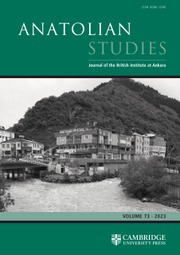Article contents
Frank Calvert, Henry Austen Layard and Heinrich Schliemann
Published online by Cambridge University Press: 23 December 2013
Extract
Within the past few years not a little has been written about the relationship between Heinrich Schliemann and Frank Calvert (see, for example, Traill, Calder 1986; Traill 1995; Robinson 1994; 1995; Allen 1999). The central thesis of these studies is that Schliemann mistreated Calvert in every possible way, not only financially, but also intellectually. For instance, ‘Schliemann's egotism and false claims have robbed Calvert of his proper place in the history of archaeology’ (Traill 1984).
Such statements give the impression that Calvert was a better scholar than Schliemann and that there is still a good deal in his work, as there is in that of Schliemann, which can help us. From the above interpretation by Traill one could almost believe that it is a distinct loss that Calvert has become nothing but a footnote in the works of Schliemann and that it is high time for a revaluation. Robinson is the most ardent exponent of this attempted revision. She is of the view that the world was duped by Schliemann, and that everything would have been done much better by Calvert. If truth be spoken, Schliemann has robbed us of the knowledge that Calvert would have given.
- Type
- Research Article
- Information
- Copyright
- Copyright © The British Institute at Ankara 2001
References
- 1
- Cited by


